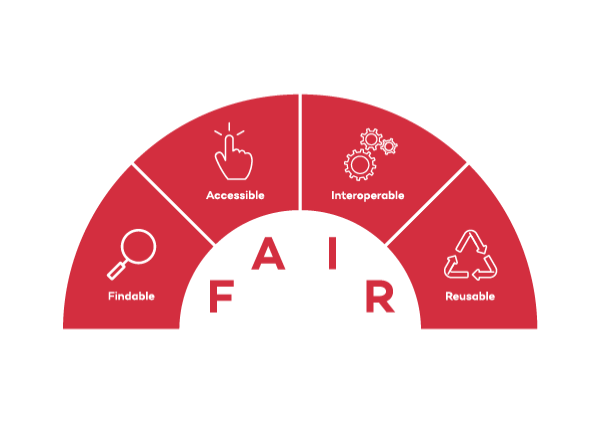
In order to enhance the reusability of your research data, you should aim to make your data FAIR. In 2016, The FAIR Guiding Principles for scientific data management and stewardship were published in Scientific Data with the aim of optimising data sharing and reuse by humans and machines. The FAIR principles describe how data should be organised so they can be more Findable, Accessible, Interoperable and Reusable, and they are promoted by some major funding bodies such as the European Commision. The authors formulated 15 principles of FAIR data, which you can find in full below.
It is a common belief that FAIR data equal open data; however, that does not necessarily need to be true.
Open research data are such data that are freely available online to anyone and can be used, modified, and shared for any purpose. Open data should be managed according to the FAIR principles so that they can be easily understood be potential user; however, even data that are not managed to a standard are considered open, if the access to them is not restricted.
FAIR data are such data that are managedin accordance with the FAIR principles, i.e., they are Findable, Accessible, Interoperable and Reusable. FAIR data may or may not be open – restricting access to data might be in accordance with the FAIR principles under certain conditions.
Ideally, research data should be open and managed in accordance with the FAIR principles.
If you want to make your data reusable, the first step is ensuring that both humans and machines can find them - making the metadata machine-readable is key.
|
F1. |
(meta)data are assigned a globally unique and eternally persistent identifier. |
|
F2. |
data are described with rich metadata. |
|
F3. |
(meta)data are registered or indexed in a searchable resource. |
|
F4. |
metadata specify the data identifier. |
Your data should be freely available, ideally via a repository. Even if the access to the data is restricted, metadata should be open.
|
A1. |
(meta)data are retrievable by their identifier using a standardized communications protocol. |
|
A1.1. |
the protocol is open, free, and universally implementable. |
|
A1.2. |
the protocol allows for an authentication and authorization procedure, where necessary. |
|
A2. |
metadata are accessible, even when the data are no longer available. |
In order to allow for your data to be integrated with other data, you should use standardised vocabulary to describe the data.
|
I1. |
(meta)data use a formal, accessible, shared, and broadly applicable language for knowledge representation. |
|
I2. |
(meta)data use vocabularies that follow FAIR principles. |
|
I3. |
(meta)data include qualified references to other (meta)data. |
The ultimate goal of the FAIR principles is to enhance reusability of research data. In order to achieve this, it is important that the data are sufficiently described and shared under the least restrictive license, so that users know how the data were generated, what they describe and how they can be used.
|
R1. |
meta(data) have a plurality of accurate and relevant attributes. |
|
R1.1. |
(meta)data are released with a clear and accessible data usage license. |
|
R1.2. |
(meta)data are associated with their provenance. |
|
R1.3. |
(meta)data meet domain-relevant community standards. |
To assess the ‘FAIRness’ of your data, you can use the FAIR self-assessment tool developed by the Australian ANDS-Nectar-RDS initiative, or you can use this checklist which was created for the EUDAT summer school by Sarah Jones and Marjan Grootveld.
Jones, Sarah, & Grootveld, Marjan. 2017, November. How FAIR are yourdata?.Zenodo. http://doi.org/10.5281/zenodo.3405141
Wilkinson, Mark D., Michel Dumontier, IJsbrand Aalbersberg et al. 2016. The FAIR Guiding Principles for scientific data management and stewardship. Scientific Data 3. 160018. DOI: https://doi.org/10.1038/sdata.2016.18
GO FAIRinitiative website
OpenAIRE Guide for Researchers: How to make your data FAIR
Residency, Invoicing and Correspondence Address
Charles University
Central Library
Ovocný trh 560/5
116 36 Prague 1
Czech Republic
Office Address
José Martího 2 (2nd floor)
160 00 Prague 6
Phone: +420 224 491 839, 172
E-mail: openscience@cuni.cz
Www: openscience.cuni.cz